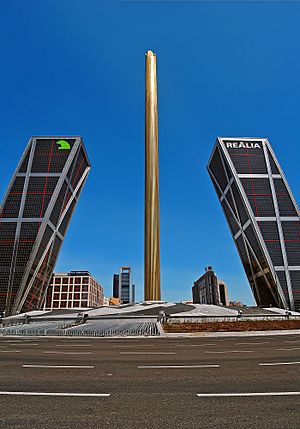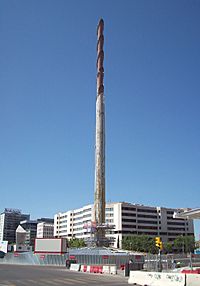Caja Madrid Obelisk facts for kids
 |
|
| Location | Plaza de Castilla, Madrid, Spain |
|---|---|
| Designer | Santiago Calatrava |
| Material | Bronze, gold, concrete |
| Height | 92 m |
| Opening date | 23 December 2009 |
| Dedicated to | 300th anniversary of Caja Madrid |
The Caja Madrid Obelisk (also known as Obelisco de la Caja or Calatrava's Obelisk) is a tall, modern monument in Madrid, Spain. It was designed by the famous architect Santiago Calatrava. This special structure stands in the Plaza de Castilla and was built to celebrate the 300th birthday of Caja Madrid, a Spanish savings bank. The bank gave this obelisk as a gift to the city of Madrid.
Contents
Building the Obelisk
Caja Madrid wanted to celebrate its 300th anniversary, which was in 2002. They asked Santiago Calatrava, a well-known architect and sculptor, to design a special monument. This monument would then be given to the city of Madrid.
Calatrava first imagined a monument that could twist and move. However, keeping it moving would cost a lot of money. So, the city of Madrid decided it would be better to keep it still.
How the Height Was Decided
The first plan was for the obelisk to be 120 meters (about 394 feet) tall. But there are many subway tunnels running underneath the Plaza de Castilla. A monument that tall would have been too heavy for the tunnels below.
Because of this, the design was changed. The height was lowered to 92 meters (about 302 feet).
Construction and Opening
In late 2007, Caja Madrid hired a construction company called Acciona. Building work started in July 2008. Before they could build, they had to remove a fountain that was already in that spot.
The obelisk was officially opened on December 23, 2009. Juan Carlos I, who was the King of Spain at the time, unveiled the monument.
What the Obelisk Looks Like
Even though it's called an "obelisk," this monument doesn't have the usual pyramid-shaped top. Its design was inspired by a famous sculpture called the Endless Column. This column was made by a Romanian artist named Constantin Brâncuși in 1938.
Santiago Calatrava described his own work as "a moving obelisk." He said it shows the strength of vertical lines and the beauty of movement.
Inside the Obelisk
The main part of the obelisk is a metal pole, 92 meters tall. This pole is 2 meters (about 6.5 feet) wide. It stands on three strong metal legs. Each of these legs weighs 50 tons!
These legs rest on three concrete pillars that go 26 meters (about 85 feet) deep into the ground. The designers chose this way to support the obelisk. This was done so it wouldn't put too much pressure on the subway tunnels below.
The Moving Strips
The main pole is covered with 462 bronze strips. These strips are about 7.7 meters (about 25 feet) long. They are attached to the pole with special joints.
These bronze strips can tilt and move. This movement makes the obelisk look like it has a waving motion as you look up it. It creates a cool visual effect of something rising and moving.
See also
 In Spanish: Obelisco de la Caja para niños
In Spanish: Obelisco de la Caja para niños
 | William Lucy |
 | Charles Hayes |
 | Cleveland Robinson |


